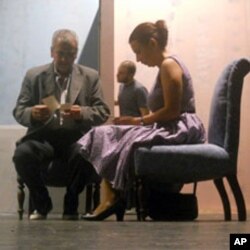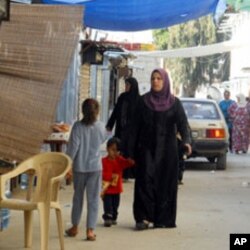In a country where second and third generation Palestinian refugees are without most civil rights, the U.N.'s 1948 resolution promising them the right to return to Palestine is still poignant. On December 11, the anniversary of the resolution, a Beirut theater company opens "Return to Haifa," a play about a Palestinian couple forced from their home in 1948 without their baby.
The play opens with a young couple standing in a doorway. She is a bride, in veils and a white dress. It is before 1948, and they are Palestinians in Haifa, now an Israeli city.
Ghassan Kanafani's story, "Return to Haifa" opens Saturday to commemorate the anniversary of the passing of 1948 U.N. Resolution 194. The resolution promised all refugees the right to return to their homes after the Arab-Israeli war, or be compensated for their properties. Much of the non-binding resolution was never implemented for either Jewish or Palestinian refugees, thus beginning the Palestinian refugee crisis.
Play director Lina Abyad says that even though the refugee crisis is 62 years old, she believes Palestinians should be able to return to their ancestral homes, or be granted civil rights in Lebanon.
"I don't think we can even start to imagine the pain of these people and what they are going through," said Abyad. "Their situation now is unbearable. It's still unbearable after 62 years no matter where they are. "
Many Palestinians in Lebanon still hold on to old house keys, or deeds to property their parents or grandparents fled. Others say gaining basic civil rights in Lebanon is their priority.
Even though many are second and third generation refugees, Palestinians are considered foreigners in Lebanon. They cannot vote, own or inherit property, and are banned from working in many professions, like medicine and law.
Last summer a law was passed that allows Palestinians to obtain work permits to do some kinds of work outside of refugee camps, but no permits have been issued. The U.N. says that that 60 percent of Palestinians in Lebanon are either unemployed or underemployed. Abyad says that this cannot go on forever. "Something has to be done. They can't stay in a city or in a country and be in the margins of this country," said the play director.
But some politicians in Lebanon say Palestinians should be given human rights, but that does not include civil rights. They say Palestinians are not granted access to Lebanese social security, schools and health care because the refugees prefer to be supported by the U.N. They say if Palestinians are incorporated into Lebanese civil society, their claim to return to Palestine will lose legitimacy in the eyes of the international community.
Actress Aliya Khalidi, who is Palestinian and Lebanese, says that even though she was born and raised in Lebanon, and has Lebanese civil rights, she still wants the right to live in Jerusalem. "There is nothing like that need or that passion that I have to go back to be in Palestine," she said.
Khalidi plays Miriam in "Return to Haifa", the Israeli woman who raises Said and Safia's abandoned son. Before Miriam moved to Haifa, she says, Miriam was a refugee from World War II.







